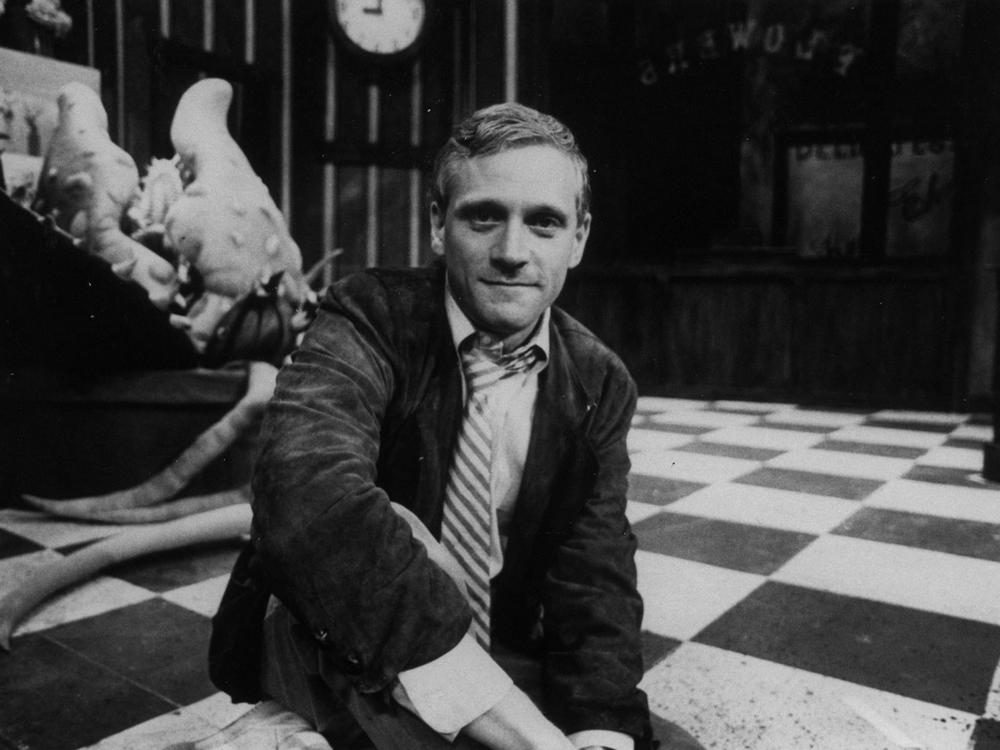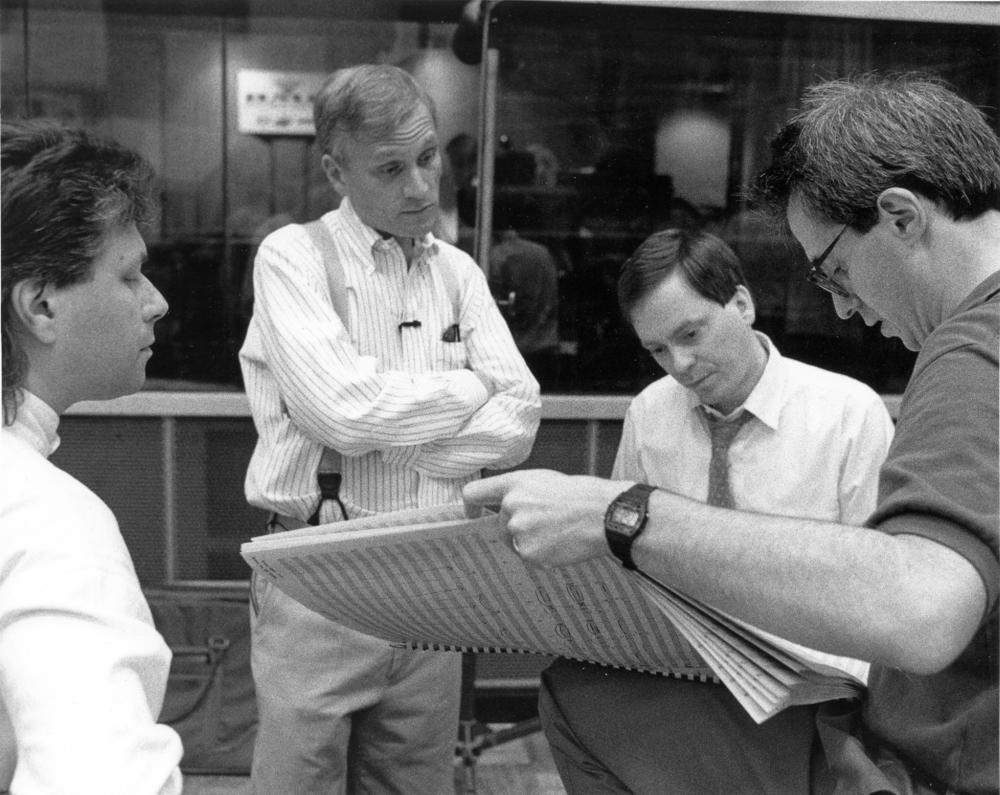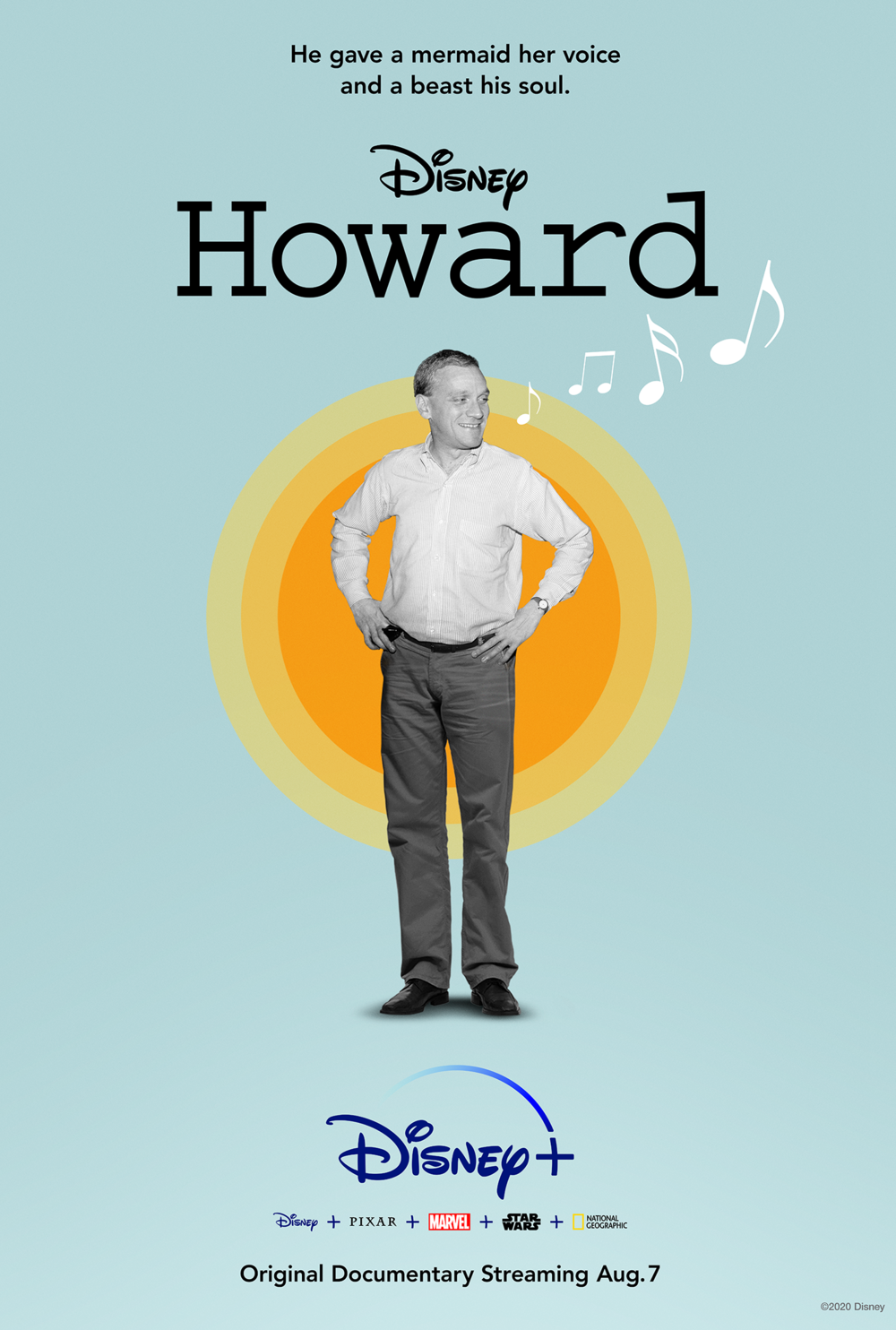Section Branding
Header Content
A New Documentary Shines A Spotlight On The Lyricist Behind The Disney Renaissance
Primary Content
Alan Menken composed the song "Prince Ali," memorably sung by Robin Williams in Disney's 1992 animated feature Aladdin, while sitting at the lyricist's hospital bed. His friend, Howard Ashman, was dying.
"His life was pitifully cut short, unfortunately, as were many at that time," says Menken. "But Howard's [death], for me, is the most personally difficult and his spirit remains very, very present still; there's something about Howard that is not just a statistic in the battle against AIDS. But as an artist, he's extremely vital — even now."
Howard, a documentary about Ashman and his work as an award-winning lyricist, is coming to streaming August 7 on Disney+. It also shows the friendship between Ashman and Menken, who met in New York City in the 1970s, where Ashman was the artistic director of a black box theater, the WPA, near Union Square. Menken had been working as an accompanist for singers and writing songs for Sesame Street, and they immediately gelled like Rodgers and Hammerstein. Together they wrote the musicals Kurt Vonnegut's God Bless You, Mr. Rosewater and the unlikely hit, Little Shop of Horrors — a monster mash parody of American musical comedies, which won several Drama Desk Awards and was adapted into a film in 1986 – before going on to work for Disney.
The documentary tracks Ashman's rise from a theater-obsessed kid in Baltimore, to his musical highs and lows (including the ill-fated Broadway show Smile with composer Marvin Hamlisch), and to his untimely death. It's told through archival photos, song demos, new interviews with family and friends and a filmed recording session from Beauty and the Beast — a Disney-lover's treasure trove.
"Howard was sick, was not always looking great," says director Don Hahn, a veteran producer of animated films at Disney who was there on the recording stage in June 1990. "But it was OK with him if we recorded that one session. It was literally one day. And everybody was there: Angela Lansbury and Paige [O'Hara] and Jerry Orbach. And that day, of maybe an hour's worth of B-roll, ended up being the core material for a lot of this movie."
Hahn deliberately kept modern faces out of the film — we only hear the voices of Ashman's mother and sister, his partner Bill Lauch and his contemporaries at Disney and in the New York theater world — because he wanted it to feel like a VHS-era time machine. He also wanted to let Ashman tell his own story, so he strung together every available recorded interview, along with songwriting work session tapes, to give it a "fly-on-the-wall style that made you feel like you were there just talking to him."
The documentary also reveals Ashman's sometimes tetchy personality.
"He was difficult in the ways that he had to be difficult, in order to have the work be what it became. And I bless him for that," says Menken. "It was authentic and important. There wasn't a cruel bone in Howard's body. He didn't suffer fools easily, and you see some of that in the way he would create his villains and how we would treat them — like the dentist [from Little Shop], or Gaston — because they were always kind of idiots [laughs]. And what was funny about them is the way, as a writer, he would beat them up."
Ashman was courted by Walt Disney Studios chairman Jeffrey Katzenberg to come to the company at a time when its animation department was on the skids.
"The animation studio was basically shutting down," Jodi Benson, the voice of Ariel in The Little Mermaid, recalled in 2016. "When we did our film, we didn't even have an animation division over at the lot; they'd been kicked off and in these little cubicles in this run-down place. Going in there and seeing all these animators crammed into these little cubicles and sleeping on the floor, it was just unbelievable to think that Walt's vision was dying."
Hahn chronicled that era in his 2009 documentary, Waking Sleeping Beauty. But his new film, Howard, is a sister documentary that shines a concentrated spotlight on Ashman's influence.
"I have a letter that I found in the Library of Congress, and it's a letter from Jeffrey Katzenberg," says Hahn. "It says, 'Howard, thanks for talking the other day. There's so many things we want you to work on. We'd love you to work on an Arabian Nights story. We'd love you to work on Little Mermaid.' And Jeffrey ends up saying: 'The collaboration of Howard Ashman and Walt Disney is just a hit waiting to happen.' "
It sure was. Ashman and Menken brought a vibrant Broadway sensibility to Disney Animation — where songs drove the story, where actors with singing talent were cast, where a variety of musical styles were brought to bear — and ushered in the Disney Renaissance. Their three films netted enormous box office and critical accolades, and the pair was nominated for six Academy Awards, winning best original song for "Under the Sea" and "Beauty and the Beast."
The film also makes it painfully clear just how few works Ashman was able to produce before the AIDS epidemic claimed his life. Ashman died before he finished Aladdin — lyricist Tim Rice stepped in to write "A Whole New World" with Menken — and even before Beauty and the Beast premiered in November 1991. He was only 40.
"It was so tragic when Howard died," Ron Clement, co-director of The Little Mermaid, said in 2016. "I think there was a feeling that he was irreplaceable to some degree, that you're not going to find another Howard Ashman. That was a unique combination of talents."
"There's a trunk that we have," says Menken. "There was a partial musical that we wrote based on the life of Babe Ruth, and there were five songs from that. I'm in the early process of trying to put together a musical. There's a body of songs — of which 'Sheridan Square' was one — that we wrote as individual songs. Some have been recorded; others, I intend to introduce to the world in the best possible way."
Over the years, Menken has worked outtakes from the Disney animated musicals into their Broadway adaptations so, in a way, he's never stopped working with Ashman. After the lyricist died, Menken worked his grief out in the form of a song with a lilting melody that he called "My Old Friend." He set it aside, but when he was working on the stage version of Beauty and the Beast, he converted the tune into Belle's song, "Home."
"I used that theme, in a way, consciously," Menken says, "because it kind of threaded a connection to Howard into the Broadway show, beyond what he'd already created."
For Menken, Ashman remains vital to this day, both in the way his work lives on in every new generation that discovers it and in the work of songwriters like Benj Pasek and Justin Paul (La La Land) and Lin-Manuel Miranda, who have all cited Ashman and Menken as influences.
"I'm nine when Little Mermaid comes out," Miranda said in 2016, "and then I'm there for Beauty and the Beast, Aladdin. I think that one of the innovations that Ashman and Menken brought to [Disney songwriting] was sort of this Broadway sensibility, of really almost conversational-level lyrics, contrasted with this epic melody and epic storytelling. That's some of my favorite stuff, is when it doesn't feel like an anthem but it feels like a character going through something. I think of Ariel trying to name the human items that she's got in her little treasure collection. I think of Belle going, 'It's my favorite part because, you'll see' — you know, interrupting a thought process. That's the stuff that I try to embody in my work when I write."
"If it weren't for [Ashman], Disney Animation would not be where it is today," said Benson, Ariel's voice actor. "When you went to the movies, people were applauding like they're watching a Broadway show. I don't think we had had that before at Disney — hardly at all — where you could appeal to all age bracket and still have the humor that the adults could enjoy, over and over again. So the whole thing was just a perfect, perfect, magical moment in time that I don't know we've ever had since."
Menken shared his memories — many deeply personal, many painful — in interviews for the documentary. When Hahn sent him a rough cut, he told the director he had to write the score.
"I said, 'Well, Alan, I can't afford you. You know, documentaries are notoriously done on micro-budgets,' " says Hahn. "He said, 'That's not the point. This is my story, and my opportunity to pay tribute, musically, to Howard.' And I was so moved by that. He went away over the holidays that year, and sent back an amazing track of him sitting at the piano, playing what he wanted to say about Howard."
Menken's piano tracks were then adapted and orchestrated by composer Chris Bacon for the final score.
"Oh my god, was it a labor of love," says Menken. "I feel deeply connected to Howard, and I just felt that I wanted music that, if he was directing it, he would have wanted to put in there. I was simply trying to reach into my heart and find a motif that simply expressed my feelings about Howard. It's got a childlike quality to it, certainly, a simplicity to it. There's a certain shimmering and anticipation of a door opening and what happens just before it's revealed — this thing he's created."
The composer says this was really like his final collaboration with Howard. So, almost 30 years after he died, 2020 brings a new work with words by Ashman and tunes by Menken.
Copyright 2020 NPR. To see more, visit https://www.npr.org.



